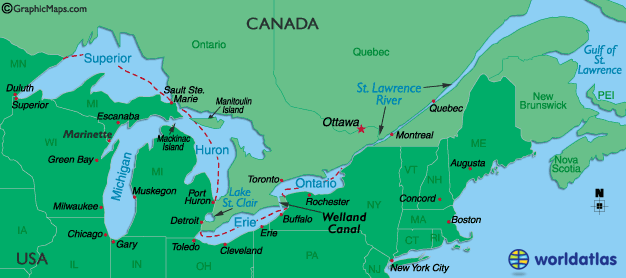 |
| The Great Lakes |
By Maude Barlow, The Huffington Post, December 18, 2011
There are huge and growing problems in the Great Lakes.
Water use is growing at a rate double that of the population, and we
now know that by 2030, global demand will outstrip supply by 40 per cent. Lack
of access to clean water is the greatest killer of children by far.
So we who live around the Great Lakes of North America have a very
special responsibility to preserve and care for them in the light of the global
reality now so clear.
While there have been some breakthroughs -- on PCBs, acid rain, and
Lake Erie for example -- as well as many border treaties to protect air and
water quality and fisheries, they are not enough to offset other damage, both
existing and new.
Ongoing issues include climate change, over-extraction, non-point
pollution, continued high levels of sewage discharge into the Lakes, the loss
of wetlands and forests, and invasive species.
New issues include gas and oil exploration, including fracking and the
export of bitumen from Canada's tar sands to 17 refineries on the U.S. side of
the Great Lakes; new mining operations, including a vast copper and nickel ore
deposit that runs from the tip of Lake Superior to Lake Ontario; and possible
nuclear waste shipments on the Lakes.
So the question must be: why is the crisis growing?
With so many wonderful people, elected officials and environmental groups
working hard to save and protect the Great Lakes, what is the problem?
There are competing visions of what the Lakes are for and who they
serve. One vision -- the wrong one -- is winning.
Some see the Great Lakes as a watershed that gives us all life and
livelihood and is a living ecosystem to be nurtured, protected and preserved
for future generations. But too many others, including some governments, see
the waters of the Great Lakes as a huge resource for our convenience, pleasure
and profit.
From the building of the St. Lawrence Seaway, to the control of water
levels in the Lakes in order to promote shipping and trade, we have
predominantly viewed the Great Lakes as an industrial engine for regional
growth and prosperity, rather than an endangered watershed.
Ontario has its "Open for Business Act" clearly aimed to use
its abundant water as an economic incentive to locate business there.
Milwaukee City Council is promoting a project called WAVE -- Water
Attracting Valued Employees -- to use the "comparative advantage" of
Lake Michigan to attract water intensive industry from the South with special
low water rates.
We also have the case of chronic under funding -- especially on the
Canadian side -- and inconsistent enforcement of environmental laws and
regulations.
What would happen if the citizens living around the Great Lakes
decided to collectively protect them based on the very principles and practices
that informed the First Peoples of the region, namely that the Lakes must be
shared equitably and responsibly by all who live around them and protected for
seven generations to come?
My answer: a new narrative for the Great Lakes to replace the current
narrative that they serve predominantly as an industrial engine for growth and
prosperity, a narrative I hope elected officials, the International Joint
Commission (IJC), and ordinary people will embrace.
This new narrative would declare the Great Lakes to be a lived Commons
to be shared, carefully managed, enjoyed by all, and protected by the Public
Trust Doctrine.
The Great Lakes could be designated as a bioregion, understanding that
while there are many political jurisdictions managing the basin, it is in fact
one integrated watershed and must be governed as such.
A Great Lakes Basin Commons would respect and understand the fact that
many make their livelihoods from the bounty of the Lakes and would not attempt
to shut down industrial activity or food production per se.
But this new narrative would reject the view that the primary function
of the Great Lakes is to promote the interests of big industry, big
agribusiness and the powerful to the extent that they get preferential access
and are often allowed to break environmental laws.
And it would embrace the notion that the Lakes must be carefully
managed for the good of the entire community, and that all activity -- public
and private -- would come under strict public oversight and accountability and
operate within a mandate whose goals are the restoration and preservation of
the waters of the basin and justice for all who live around it.
We need a Great Lakes Basin Commons Watershed Plan with basin-wide
consistent laws, regulations and definitions to protect these waters as a human
right and a public resource, and we need to empower local communities to have a
much greater say in all decisions affecting their local watershed.
I
understand it would require jurisdictional cooperation that many tell us cannot
be done; but I argue that if our governments can cooperate for
business-friendly trade and perimeter deals, then they can do it to save the
Great Lakes of North America!
Maude Barlow is the Chairperson of Council of Canadians
Maude Barlow is the Chairperson of Council of Canadians
No comments:
Post a Comment